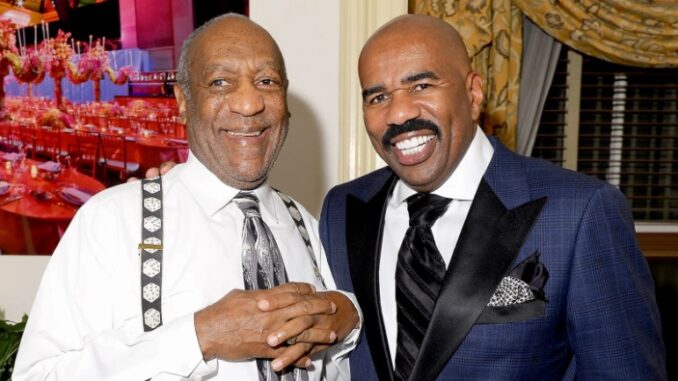
Bill Cosby, once hailed as “America’s Dad” for his role on The Cosby Show, faced serious allegations that culminated in a conviction for sexual assault.
This declaration of loyalty highlights a personal commitment that many might find admirable. It raises the age-old question: how do we balance loyalty to friends with the moral implications of their actions? For Harvey, standing by Cosby seems to stem from a deep-rooted belief in personal relationships, suggesting that friendship should endure even in the face of controversy. While loyalty is often viewed as a virtue, it can be complicated when friends are embroiled in serious allegations. Harvey’s stance underscores the tension between supporting a friend and acknowledging their actions. Critics argue that unwavering loyalty in the face of wrongdoing can enable harmful behavior, while supporters might contend that true friendship means standing by someone no matter what.

Harvey’s comments bring to light the complexity of these dynamics. As a public figure, he understands that his words carry weight. By expressing his support for Cosby, he implicitly aligns himself with the challenges and accusations faced by his friend, which can create a perception of endorsement or denial of the gravity of the situation. Harvey’s comments were met with a mix of support and backlash. Some praised his loyalty, arguing that friendship should prevail in difficult times. Others criticized him, suggesting that supporting someone accused of serious crimes undermines the voices of survivors. This divergence in opinions reflects the broader societal debate about accountability and the responsibilities that come with friendship.
The discussions around Harvey’s stance also highlight the generational and cultural differences in how loyalty is perceived. For some, loyalty is a fundamental principle that transcends circumstances, while others prioritize ethical considerations and the impact of one’s actions on society. Friendship in the public eye often operates under a microscope, with every statement and action analyzed by media and fans alike. For Harvey, this means navigating the complexities of his relationship with Cosby while also being aware of the implications of his support. Public friendships can sometimes become transactional, with expectations of support tested against societal norms and values.
In his defense of Cosby, Harvey not only affirms his loyalty but also emphasizes the importance of standing by friends during their darkest moments. This sentiment resonates with many who believe that true friendship means offering support without judgment. However, it also raises questions about the boundaries of that support and whether there are situations where silence or withdrawal might be more appropriate. Steve Harvey’s stance on Bill Cosby illustrates the intricate balance between friendship and accountability. While loyalty is a cherished quality, the implications of standing by someone accused of serious wrongdoing cannot be ignored. As society continues to grapple with issues of sexual violence and accountability, the conversations sparked by Harvey’s comments serve as a reminder of the importance of thoughtful dialogue about loyalty, ethics, and personal relationships.
Ultimately, the challenge lies in defining what true friendship means in an era of increased awareness and sensitivity to the experiences of survivors. As Harvey and others navigate these complex waters, it becomes clear that loyalty, while admirable, must be tempered with a commitment to justice and empathy for those affected by the actions of others.
